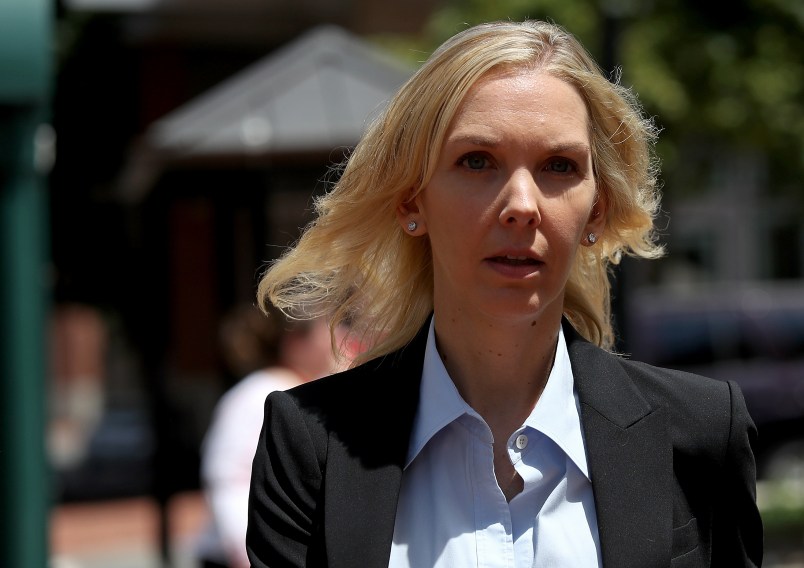ALEXANDRIA, VA — A bookkeeper for Paul Manafort revealed at his trial on Wednesday that he and his business deputy Rick Gates sent banks documents claiming to be financial statements for Manafort’s companies that inflated their net incomes by millions of dollars when compared to her records.
Bookkeeper Heather Washkuhn (pictured) said the documents sent by Manafort and Gates were similar to the statements her bookkeeping company assembled for their clients, but had different fonts and spacing, and lacked her company NKSFB’s disclaimer.
One of those documents, emailed to a Banc of California employee by Rick Gates in March 2016, was sent after Washkuhn declined to provide a digital version of the NKSFB statement for Manafort’s company’s net income in 2015.
Another document, emailed by Manafort to a Federal Savings Banks employee, included mispellings for the words “September” and “review,” her testimony revealed.
Those episodes and other details provided by Washkuhn painted a picture of Manafort facing dire financial conditions in the months leading up to his stint on President Trump’s 2016 campaign. She walked through documents provided by the prosecution that suggested Manafort and his deputy, Gates, doctored financial statements when applying for loans, which she could differentiate from the formatting, the discrepancies in the numbers, and the spelling error.
Manafort is now facing charges of bank fraud and tax fraud in Virginia as part of special counsel Robert Mueller’s probe. He has pleaded not guilty.
Washkuhn took the stand Wednesday, after the jury had heard this week from political consultants who worked with Manafort in Ukraine, as well as from vendors from which Manafort purchased luxury goods, services and real estate using wire transfers from foreign accounts.
At the beginning of her testimony,Washkuhn said that she was unaware that numerous accounts from which she recorded Manfort-related income and loans were foreign.
The prosecutors allege that Manafort’s Ukraine income dried up in 2014, after the ouster of his client, the Ukrainian president.
Washkuhn testified that in 2016, Manfort’s consulting firm posted a net loss of more than $1 million.
She read aloud emails from January 2016 where she had to ask Manafort repeatedly to direct her to pay certain bills and to provide money for her to pay them. She said that a “couple of times” he was behind paying the bills for her bookkeeping services.
She read a January 2016 email from Gates in which he asked Washkuhn if he could draw on one of Manafort’s lines of credit. Washkuhn replied that the credit line was fully drawn.
In March 2016, Gates asked Washkuhn for a Microsoft Word version of a profit and loss statement, but Washkuhn was unable to provide anything other than a scanned version of a PDF printed from her company’s computer.
In a later email, Gates told Washkuhn that “he” wanted to add $2.6 million in accrued revenue to the profit and loss statements. Asked who Gates referred to with “he,” Washkuhn replied, “I would assume Paul.” Washkuhn also refused to make that change.
On the same day in March 2016, Gates sent an email to an employee at the Banc of California with a 2015 profit and loss statement for Manafort’s consulting firm inflating the income by about $4 million, according to Washkuhn’s testimony.
Additional documents that Washkuhn read during her testimony suggested that Gates asked Washkuhn to reclassify a $1.5 million loan as income in 2015, explaining that it would be forgiven. This lines up with the prosecution’s allegation in the Virginia indictment that Manafort and Gates reclassified a $1.5 loan as income when applying for a loan.
The prosecution also offered two different documents on the insurance policy for Manafort’s Brooklyn property, which suggested that Gates doctored an insurance policy to remove a reference to the mortgage taken out on the property. The prosecution has alleged that Manafort lied about mortgages on his properties when applying for new loans.
During cross examination of Washkuhn, Manafort attorney Thomas Zehnle focused his questioning on Rick Gates’ involvement with Manafort’s finances and Washkuhn’s interactions with him.







Worked on it for free.
Yeah, right. What kind of few-person shop even has the money to sustain that kind of loss?
You hock a few ostrich jackets and a karaoke machine and boom you’re solvent again.
Hey, who didn’t? Just a decent, honest, working-class blue collar guy like the rest of us.
So the premise is that although he was officially losing money and therefor not owing taxes, the fake invoices show he was really making money?
What kind of person would offer to be campaign chairman of a major presidential campaign for free?